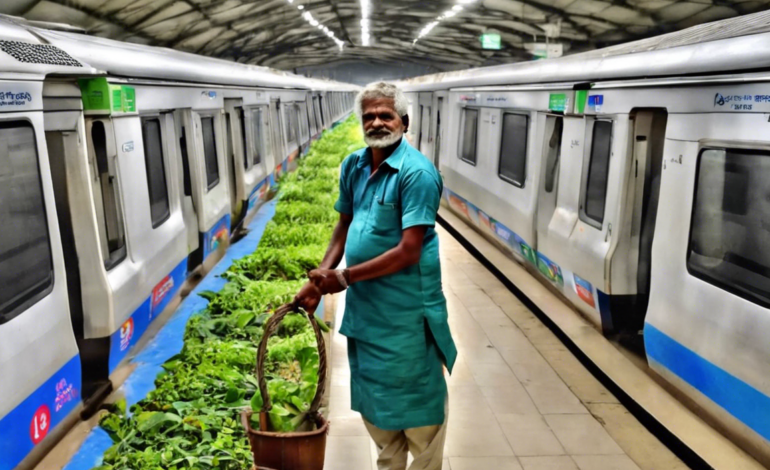Bengaluru Metro Farmer: Cultivating Sustainability in the Urban Landscape

Urban farming has seen a resurgence in recent years as more people look for ways to reconnect with nature and lead sustainable lifestyles. One such innovative initiative is the Bengaluru Metro Farmer project, which aims to cultivate sustainability in the urban landscape through community farming on metro station rooftops in Bengaluru, India.
The Concept of Bengaluru Metro Farmer
The Bengaluru Metro Farmer project was launched in 2018 as a joint effort between the Bangalore Metro Rail Corporation Limited (BMRCL) and the Indian Institute of Horticultural Research (IIHR). The idea behind the project is to utilize the unused rooftop spaces of metro stations for organic farming, thereby promoting sustainable practices in the city.
Benefits of Urban Farming
Urban farming offers a multitude of benefits, both for the environment and the community. Some of the key advantages include:
-
Food Security: With rapid urbanization leading to increased food demand, urban farming helps enhance food security by producing fresh, organic produce locally.
-
Environmental Sustainability: By reducing the carbon footprint associated with transporting food from rural areas to cities, urban farming helps lower greenhouse gas emissions and promote environmental sustainability.
-
Community Engagement: Urban farming initiatives like Bengaluru Metro Farmer foster community engagement and empower residents to take an active role in food production and environmental conservation.
Key Features of Bengaluru Metro Farmer
The Bengaluru Metro Farmer project incorporates several innovative features that set it apart as a pioneering initiative in urban agriculture:
-
Rooftop Farming: The project utilizes the expansive rooftop spaces of metro stations for cultivating a variety of crops, including vegetables, fruits, and medicinal plants.
-
Organic Farming Practices: Bengaluru Metro Farmer follows strict organic farming practices, avoiding the use of synthetic pesticides and fertilizers to ensure the production of safe and healthy produce.
-
Community Participation: The project encourages community participation through gardening workshops, educational programs, and volunteer opportunities, fostering a sense of ownership and pride among residents.
-
Waste Management: Bengaluru Metro Farmer implements efficient waste management practices by composting organic waste from the metro stations to create nutrient-rich compost for the farming activities.
Challenges and Solutions
Despite its many benefits, urban farming faces several challenges, including limited space, water scarcity, and regulatory hurdles. The Bengaluru Metro Farmer project addresses these challenges through innovative solutions:
-
Vertical Farming: To overcome space constraints, the project implements vertical farming techniques, utilizing vertical structures to maximize the cultivation area within the limited rooftop space.
-
Water Conservation: Water scarcity is a significant concern in urban areas, but Bengaluru Metro Farmer incorporates drip irrigation systems and rainwater harvesting techniques to efficiently use water resources.
-
Policy Advocacy: The project advocates for supportive policies and regulations to facilitate urban farming initiatives, working closely with government agencies to create a conducive environment for sustainable agriculture.
FAQs about Bengaluru Metro Farmer
-
What crops are grown in the Bengaluru Metro Farmer project?
A variety of crops are grown, including tomatoes, brinjals, chillies, leafy greens, herbs, and medicinal plants. -
How can community members get involved in the project?
Community members can participate in gardening workshops, volunteer for farming activities, and attend educational programs organized by Bengaluru Metro Farmer. -
Is the produce from Bengaluru Metro Farmer available for sale to the public?
The produce is primarily used for educational and community purposes, but surplus produce is sometimes made available for sale at local markets. -
What are the environmental benefits of urban farming in Bengaluru?
Urban farming helps reduce carbon emissions from food transportation, promotes biodiversity in urban areas, and mitigates the urban heat island effect through vegetation. -
How does Bengaluru Metro Farmer contribute to food security in the city?
By producing fresh and organic produce locally, Bengaluru Metro Farmer enhances food security, reduces dependency on external food sources, and promotes self-sufficiency.
In conclusion, the Bengaluru Metro Farmer project exemplifies the potential of urban agriculture to promote sustainability, community engagement, and environmental conservation in densely populated cities. By harnessing the power of rooftop spaces and community involvement, this innovative initiative paves the way for a greener and more resilient urban landscape in Bengaluru.




